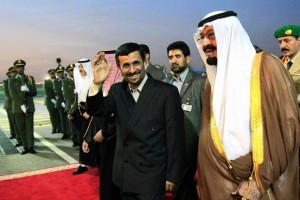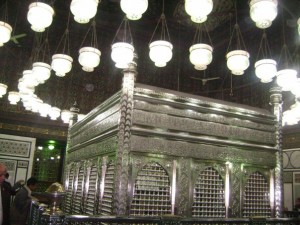Osama bin Laden’s death in his Pakistani hiding place is like the removal of a tumor from the Muslim world. But aggressive follow-up therapy will be required to prevent the remaining Al Qaeda cells from metastasizing by acquiring more adherents who believe in violence to achieve the ‘purification’ and empowerment of Islam.
Fortunately, Bin Laden’s death comes at the very moment when much of the Islamic world is being convulsed by the treatment that Bin Laden’s brand of fanaticism requires: the Arab Spring, with its demands for democratic empowerment (and the absence of demands, at least so far, for the type of Islamic rule that Al Qaeda sought to impose).
But can the nascent democracies being built in Egypt and Tunisia, and sought in Bahrain, Libya, Syria, Yemen, and elsewhere, see off the threats posed by Islamic extremists? In particular, can it defeat the Salafi/Wahhabi thought that has long nurtured Osama bin Laden and his ilk, and which remains the professed and protected ideology of Saudi Arabia?
The fact is that before the US operation to kill Bin Laden, Al Qaeda’s symbolic head, the emerging democratic Arab revolutions had already, in just a few short months, done as much to marginalize and weaken his terrorist movement in the Islamic world as the war on terror had achieved in a decade. Those revolutions, whatever their ultimate outcome, have exposed the philosophy and behavior of Bin Laden and his followers as not only illegitimate and inhumane, but actually inept at achieving better conditions for ordinary Muslims.
What millions of Arabs were saying as they stood united in peaceful protest was that their way of achieving Arab and Islamic dignity is far less costly in human terms. More importantly, their way will ultimately achieve the type of dignity that people really want, as opposed to the unending wars of terror to rebuild the caliphate that Bin Laden promised.
After all, the protesters of the Arab Spring did not need to use – and abuse – Islam to achieve their ends. They did not wait for God to change their condition, but took the initiative by peacefully confronting their oppressors. The Arab revolutions mark the emergence of a pluralist, post-Islamist banner for the faithful. Indeed, the only people to introduce religion into the protests have been rulers, such as those in Bahrain, Yemen, Libya, and Syria, who have tried to use fear of the Shia or Sunni “other” to continue to divide and misrule their societies.
Now that the US has eradicated Bin Laden’s physical presence, it needs to stop delaying the rest of the therapeutic process. For the US has been selectively – and short-sightedly – irradiating only parts of the cancer that Al Qaeda represents, while leaving the malignant growth of Saudi Wahabism and Salafism untouched. Indeed, despite the decade of the West’s war on terror, and Saudi Arabia’s longer-term alliance with the US, the Kingdom’s Wahhabi religious establishment has continued to bankroll Islamic extremist ideologies around the world.
Bin Laden, born, raised, and educated in Saudi Arabia, is a product of this pervasive ideology. He was no religious innovator; he was a product of Wahhabism, and later was exported by the Wahhabi regime as a jihadist.
During the 1980’s, Saudi Arabia spent $75 billion for the propagation of Wahhabism, funding schools, mosques, and charities throughout the Islamic world, from Pakistan to Afghanistan, Yemen, Algeria, and beyond. The Saudis continued such programs after the terror attacks of September 11, 2001, and even after they discovered that “the Call” is uncontrollable, owing to the technologies of globalization. Not surprisingly, the creation of a transnational Islamic political movement, boosted by thousands of underground jihadi Web sites, has blown back into the Kingdom.
Like the hijackers of 9/11, who were also Saudi/Wahhabi ideological exports (15 of the 19 men who carried out those terror attacks were chosen by Bin Laden because they shared the same Saudi descent and education as he), Saudi Arabia’s reserve army of potential terrorists remains, because the Wahhabi factory of fanatical ideas remains intact.
So the real battle has not been with Bin Laden, but with that Saudi state-supported ideology factory. Bin Laden merely reflected the entrenched violence of the Kingdom’s official ideology.
Bin Laden’s eradication may strip some dictators, from Libya’s Muammar el-Qaddafi to Yemen’s Ali Abdallah Saleh, of the main justification they have used for their decades of repression. But the US knows perfectly well that Al Qaeda is an enemy of convenience for Saleh and other American allies in the region, and that in many cases, terrorism has been used as a pretext to repress reform. Indeed, now the US is encouraging repression of the Arab Spring in Yemen and Bahrain, where official security forces routinely kill peaceful protesters calling for democracy and human rights.
Al Qaeda and democracy cannot coexist. Indeed, Bin Laden’s death should open the international community’s eyes to the source of his movement: repressive Arab regimes and their extremist ideologies. Otherwise, his example will continue to haunt the world.
By Mai Yamani

























